Al Gore has become a rather prolific statesman since his Vice-Presidency. Between Current.tv and the documentary An Inconvenient Truth, which details the global warming crisis in an informative and entertaining approach, he has become hardly the withering embarrassment you'd expect of most ex-White House '"leaders".
And even more surprisingly, Gore's documentary is actually drawing audiences!
According to Variety it "grossed a fantastic $365,787 at just four theaters in New York and L.A.; its $70,585 per play gross over three days is the highest average take for any pic this year, the highest average for any pic over Memorial Day weekend and the highest-ever average for a documentary."
Cume since its Wednesday opening is $489,336.
Paramount Classics will expand the heavily hyped Al Gore starrer to between 60 and 75 theaters in the top 10 markets next frame and continue to widen it throughout June.
Share ideas that inspire. FALLON PLANNERS (and co-conspirators) are freely invited to post trends, commentary, obscure ephemera and insightful rants regarding the experience of branding.
Wednesday, May 31, 2006
Trend: "Don't Panic": An Inconvenient Truth
Trend: Making information interactive

I continue to be amazed by all the really interesting applications of creativity making information more engaging, accessible and interactive. This application (via infosthetics.com) allows you to visually identify word patterns and themes in presidential State of the Union addresses going all the way back to Washington. A really fascinating journey through time (and cultural spin). Take a look at themes around crises periods across time and see how the language changes. Perhaps we can take lessons in leadership and persuasion from more successful presidents in that they clearly changed the language and tenor of the national debate of their day. This stuff almost makes me want to go back to college just for the pleasure of it.
Tuesday, May 30, 2006
$450 for top-end version of Windows Vista!

According to IT Wire, the high-end version of Windows Vista - Vista Ultimate - will retail for $450 for a single license. The ultimate version of Office will be even steeper at $679. Add in the costs for upgrades to your PC and running Office and Windows come 2007 could be 2 - 3X higher than it is now.
I applaud Microsoft for segmenting its products and have long thought that they should emulate Sony's Qualia line, that seems to have been killed by Sir Howard Stringer. However, they really need to do a better job of distinguishing these Ultimate products from the others. If they positioned them as statements and NOT for average consumption, they'd probably get a lot more goodwill and sell just as many.
I think the idea of high-end software is one whose time has come. Just don't market it to the masses, that raises people's hackles especially coming from a company as profitable as Microsoft.
Sopranos writer creates 60s ad show.
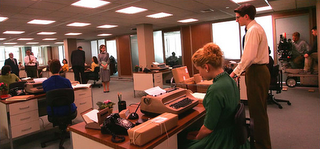
This sounds interesting, the NYT reports on a new series that AMC is considering called Mad Men about a fictional (whitebred) advertising agency in the 60s that is dealing with the start of the creative revolution led by the Jews.
Each episode will also be underwritten by a single advertiser.
According to the creator, "Advertising was the sexiest job of the period," back then, it's taken a bit of a tumble since.
Monday, May 29, 2006
It's Official:- Men Need Help to be Helpful.
You say CPG, for me it's FMCG... but common to both is the sad state of the advertising that goes with it... Cliched Suzie-homemaker whose never ending quest to be the perfect 'mom' is aided by the latest and greatest performance-tweak to her favourite household products:
"Now even softer!" "Now twice as much fun to dust with".
No, more - from june 12th Brawny are publicly declaring that the biggest difference to womens lives will not come off the shelf at the store... but off the couch at home.
Yep, Men who are able to help out... who can be manly without being macho... shouldn't be so hard, right?
But of course, we all know better than that!
The answer...
Brawny Academy - where women send the man in their life to clean up his act:
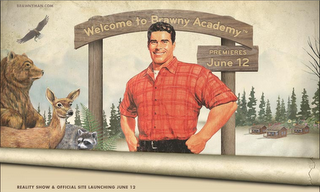
http://www.brawnyacademy.com
http://www.brawnyacademy.com/tvspot.html
Friday, May 26, 2006
Inbox of Immaturity

I'm sorry, but I love this guy. When I throw up the V-W hand sign, I do it in reverse. He's the reason the line, "don't hate the playa, hate the game" is still fresh. Oh it's not? Who else is going to give you "a thousand dollars cash-mah-knee!"?
Things that make me happy... besides jokes about yo momma:
From my life back in NYC: http://standingonthebox.blogspot.com/2006/05/close.html
In the right corner scroll down to “don’t tread on this” and watch it. Unbelievable: http://www.ussoccer.com/articles/viewArticle.jsp_280988.html
"Grab bag of immaturity" from Aki, including a sex Education film: http://www.shocku.com/videos/index.php?v=964&r=ins&o=nouv&beg=
You know how I hate these birds.: http://www.killthepigeons.com
Gotta love Leroy: http://video.google.com/videoplay?docid=1519564146138019456&q=Leroy+Jenkins
Thursday, May 25, 2006
Credit Suisse vs. Mnels

According to Appleinsider, Credit Suisse has released a report that paints a pretty rosy picture for the iPod market moving forwards. They predict a doubling of the iPod installed base between now and 2009.
On a side note, does anyone else besides me enjoy Mark's commenting on a post about happiness?
Overexposure alert

Is anyone else getting a little tired of so many marketers jumping on the "i" bandwagon? I wonder if Apple dares to, or should reel-in some of the stuff that clearly infringes on the trademark. I know that is anathema to current digital/viral marketing strategy, but I can see the makings of a temporal stereotype (the "i" decade) that will feel pretty dusty soon at this rate or at least force Apple to reinvent. Maybe that's not a bad thing? Maybe that's the point? I just don't know. (via The Hidden Persuader).
Dell weighed down by management consultants?
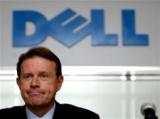
Cnet has a pretty interesting and insightful piece about the problems with Dell. Only a couple years ago, Dell seemed unstoppable, now they're being given a run for their money by a reinvigorated HP and customer complaints around Dell are way up.
In Cnet's view, Dell started to believe their own hype, AND they started to "round out" their management ranks from McKinsey, Bain and some other consulting companies.
HP on the other hand has hired an "invisible" new CEO and is just getting the job done.
Wednesday, May 24, 2006
Great stories. Simple pics.
I love reviews of press photos the beeb does regularly like this one.
While this collection is not the best, I think in general the storytelling that the press manage through their best photography puts out efforts in perspective, and we could learn much...




http://news.bbc.co.uk/1/shared/spl/hi/pop_ups/06/in_pictures_the_press_photographer0s_year_/html/1.stm
Trend: Happiness Decline. The Greatest Gift That We Posses?

The politics of happiness. What is government doing about it! What perhaps should we?
A couple of interesting articles about the science and value of happiness. It’s causes (having over approx $20,000 dollars a year helps it would seem, but more does nothing for you), and things that prevent it (advertising apparently as it make us feel less well off). Interesting that at a time when advertising effectiveness is under increased question, boffins are ascribing it the power to make us less happy –
Interesting, amusing, but also kind of sad and I think if we examine the implication just a little, it might suggest new ways for us as a profession to think about what ‘great work’ should do…
So first up the Happiness Formula….
“In 2002, The Prime Minister's Strategy Unit held a "life satisfaction" seminar in Whitehall discussing the implications of a "happiness" policy.
A few month's later, Downing Street published an "analytical paper" which considered how happiness might affect different policies including:
A happiness index
Teaching people about happiness
More support for volunteering
"A more leisured work-life balance"
Higher taxes for the rich”
Fabulous! Sounds like something from Trumpton… However. There are several articles on the subject including this one showing that this idea may not be so fanciful, and people are overwhelmingly in favour…
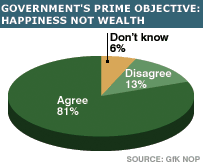
“In almost every developed country, happiness levels have remained largely static over the past 50 years - despite huge increases in income.
What the happiness research suggests is that once average incomes reach about £10,000 a year, extra money does not make a country any happier.
How does Britain compare?
Our poll asked people how satisfied they were with their lives as a whole using a one to 10 scale.
The mean score was 7.3 which puts the UK some way down the world rankings.
One recent table has Switzerland as the happiest country, followed by Denmark, Sweden, Ireland and the USA. Britain comes eighth.
Many different organisations, including the United Nations, have attempted to compare the happiness rates of different countries.
Should politicians try to make us happier?
In our opinion poll we asked whether the government's prime objective should be the "greatest happiness" or the "greatest wealth".
A remarkable 81% wanted happiness as the goal. Only 13% wanted greatest wealth.”
There are so many layered truths and comebacks on this one depending on your political and cultural grounding. It's pretty facinating and murky given that it seems like it should be such a simple emotion and goal, and is clearly so important in people's lives. Parallels to so much of the work we've done on finance over the years and the double edged sword of more money = more choices / people want choices but yet are often simply pressured by them.
Trend: Gas Watch: GM's Free Gas Conundrum
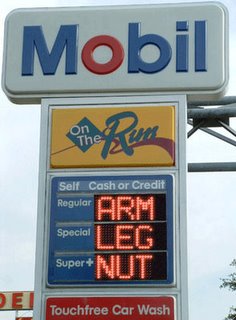
General Motors announced that it will help foot the high cost of gasoline for auto shoppers in California and Florida. GM is starting a marketing program in those two states that caps gasoline prices at $1.99 a gallon when a consumer buys a certain GM vehicle.
While this may be a clever-enough promotion in normal times, this measure simply doesn't really help the big picture...namely that the gig is up for most of GM's portfolio of gas-guzzling (or perceived gas-guzzling) big cars. And giving away free gas to tempt buyers to buy a car they increasingly don't want is just not a way to market against the Japanese. GM needs to get back in the shop and design cars people want, not try to Jedi Mind Trick us into wanting the cars they got.
some new Gas Stats to chew on:
A new survey by Consumer Reports says that as many as 50 percent of consumers thinking about buying a new vehicle will consider hybrids and 38 percent are considering either flexible-fuel vehicles or diesel vehicles.
Whether or not they are considering a hybrid, consumers are looking to downsize. More than half of those planning to replace their car, 55 percent, said they are thinking about a small car, compared to about one-fifth who are focusing on a family sedan or small SUV.
The 2006 Gas Prices Consumer Intentions & Actions Survey found more than three-fourths of American consumers report high gas prices have cut into their discretionary spending, up from 67 percent in 2005 and 57 percent in 2004.
Memorial Day is the official start of the summer driving season but this year rising gas prices are slowing summer travel plans according to the American Automobile Association.
High gas prices mean people will take fewer trips than expected over Memorial Day weekend and those trips will be closer to home.
The price of gas is the No. 1 reason people give for traveling less or not at all.
The National Retail Federation estimates that nearly half of all Americans will combat the rising cost of fuel by driving less, while another 37 percent will decrease vacation and 36 percent will cut back on dining out.
The 2006 Gas Prices Consumer Intentions & Actions Survey found more than three-fourths of American consumers report high gas prices have cut into their discretionary spending, up from 67 percent in 2005 and 57 percent in 2004.
Fluctuating gas prices are also taking consumers out of the carwash lines, according to recent reports from Professional Car Care Online.
RL Group Inc., the parent of the popular roadside Cracker Barrel restaurant chain reported that quarterly profit fell 10 percent, hurt by high gasoline prices that kept consumers from eating out or traveling.
Restaurant sales at Cracker Barrel locations open at least 18 months fell 2.1 percent during the quarter, as higher check averages could not make up for fewer customers.
via Consumer Affairs
Tuesday, May 23, 2006
Cashing-in – Closing out future market growth?


I’m glad to see the web’s dad, Tim Berners-Lee, speaking up on the plans by some telcos to create a two tier internet, (charging content providers who want their high-speed video delivery to get traffic preference for example).
See BBC news article here: http://news.bbc.co.uk/2/hi/technology/5009250.stm.
Obviously an ongoing and complex debate, but I think beyond the ethical/moral issues that Sir Tim has, it would be bad news for commerce and bad news for marketing. The rush to squeeze money out of the network by charging for quality content delivery I believe would simply put the brakes on the full potential of the space. It would certainly create unhelpful inequalities for many of the more inventive and creative uses (esp user-created content) out there.
For that reason I can only see it as a bad thing for marketers in the medium and long term, even if it might seem attractive to us to get preferential delivery of video content right now when many people are still at best surfing at dsl speeds.
It had to happen

Gizmodo reports on a Nike/Apple partnership. With a pair of Nike+ trainers, an iPod Nano and a Nike+iPod sport kit you can turn your Nano into Your coach. Your personal trainer. Your favorite workout companion. according to the website but it actually looks and sounds more like Your V. Expensive Pedometer from what I can tell.
No doubt it will sell like hotcakes though.
Walmart Watch: Handshake with Sam

Activist website walmartwatch.com has publicly submitted a proposed contract--published in today's New York Times--asking CEO Lee Scott and company directors to sign onto seven moral, and practical, standards to guide the 21st century Wal-Mart:
1 "Protect human dignity of employees"
2 "Ensure quality and affordable health coverage"
3 "Use market power to improve supplier conditions and wages"
4 "Enable and embrace self-sufficiency" - end dependency on tax subsidies
5 "Buy local first" - support domestic producers
6 "Keep it clean" - demonstrate sound environmental stewardship
7 "Prove worthy of the public trust" - offer transparency with regards to business operations
The site is well-organized with very insightful quotes from Sam Walton which substantiate the Handshake initiatives.
Shakes Hands With Sam yourself at http://walmartwatch.com/handshake
Monday, May 22, 2006
Trend: Gorilla Marketing

This should really shine up Bud's Euro cred.
From the London Times (online):
Germany's beer lovers can already taste defeat
From Roger Boyes in Berlin
IT IS brown-gold and alcoholic but, then, in the scathing verdict of German beer fans, so is paint thinner.
The Germans are furious that Budweiser will be the official tipple for the World Cup, which starts next month. The American lager has secured a near-monopoly of beer sales inside World Cup stadiums and within a 500m radius of the grounds, supplanting more than 1,270 domestic breweries.
And what most upsets the fans is that Budweiser — advertised as the “King of Beers” in the US — fails to meet the ancient German standards for purity, which stipulate that beer can be brewed only from malt, hops and water. Budweiser uses rice in its production process and therefore does not qualify as a beer in the German sense.
More on the video clip goldrush

As with every intrenet phenomenon, it soon becomes so overcrowded and commercialized that people become bored and start doing something else. It seems that's soon to happen with video clips. Another new entry into the market for providing video clips is Clipsyndicate, which is an aggregator for traditional broadcast outlets to be licensed to bloggers or other web publishers. Clipsyndicate will either let you supply your own ads with the clips or will embed ads that have been bought through them.
via NYT
Microsoft pitches PAYGO PCs

The original business model for PeoplePC was a computer for $20 a month. I always thought it was pretty smart but it failed and PeoplePC became an ISP. Anyway, now Microsoft is introducing a similar plan based on a PAYGO model. They see this as a way to expand the PC base in emerging markets, and I think they're probably right.
via Reuters.
Sunday, May 21, 2006
Thursday, May 18, 2006
Walmart Watch: Always Low Wages?

Study finds Wal-Mart contributes to poverty
A study focused on the effects of Wal-Mart stores on poverty rates found that an estimated 20,000 families nationwide have fallen below the official poverty line as a result of the chain's expansion.
The study -- Wal-Mart and County-Wide Poverty -- written by Stephan Goetz, a professor of agricultural and regional economics at Pennsylvania State University, and Hema Swaminathan for the International Center for Research on Women, was published in the latest issue of Social Science Quarterly.
During the last decade, dependence on the food stamp program nationwide increased by 8 percent, while in counties with Wal-Mart stores the increase was almost twice as large at 15.3 percent, according to the study. Although Wal-Mart employs many people living in its communities, for most, the hours worked and the wages paid do not help these families transition out of poverty, the study said.
The study, which sought to identify the independent effect of Wal-Mart stores on changes in U.S. family-poverty rates at the county level, found that one of the greatest effects of a Wal-Mart opening is the closing of mom-and-pop-type operations.
The authors state in the study that "by displacing the local class of entrepreneurs, the Wal-Mart chain also destroys local leadership capacity."
Poverty rates will rise if retail workers displaced from existing mom-and pop-type operations work for Wal-Mart at lower wages because they have no alternatives, all else equal, according to the study.
The demise of mom-and-pop stores leads to the closing of local businesses that supplied those stores, such as wholesalers, transporters, logistics providers, accountants, lawyers and others. Many of these are higher-paying jobs. The study concludes that it is likely that these more highly-educated individuals depart from the rural community in pursuit of better opportunities elsewhere, contributing to the rural-to-urban exodus over the last decade, leaving behind those with fewer opportunities and raising the poverty rate by reducing the number of nonpoor households in the denominator.
Wal-Mart is estimated to employ no more than 2 percent of the average county's work force. The share of Wal-Mart's employment in total county retail jobs is substantially greater than only 2 percent. In addition, the Wal-Mart jobs may be part time as opposed to full time, leading to lower family incomes, all else equal, the study said.
via St. Louis Business Journal
Wednesday, May 17, 2006
Inbox of Immaturity

Oh yeah, it's the return of the apartment dance party. Note the bottle of wine in the young lady's hand. I assure you she's not looking for a glass. It's not just male immaturity. But this group of new links is from the fellas:
Sorry for the late notice. Hope all in NY made this event last night: http://www.nycbeard.com/
Innovative Presentation of Research: http://benfry.com/salaryper/
Hoop dreams: http://sports.espn.go.com/espn/eticket/story?page=saturdaygame
On the 24th hour of Christmas – scroll to May 12th: http://www.defamer.com/hollywood/kiefer-sutherland/kiefer-sutherland-vs-the-christmas-tree-the-video-173530.php
Good gym: http://www.yardstrength.com/media/TheYard01.wmv
Not just some video games: http://www.everyvideogame.com/
Gearing up for the World Cup: http://www.juggernart.com/games/sumo_sushi_soccer/
Would love to know how Aki found these : http://flat-d.com/index.html or http://flat-d.com/femalethong.html
Who wants lunch?: http://www.boston.com/news/odd/articles/2006/05/15/pink_taco_restaurant_name_causes_stir/
And finally, back to the art of dance: http://www.youtube.com/watch?v=dMH0bHeiRNg
Tuesday, May 16, 2006
Trend: User-Created: Bombay TV

Make your own subtitle edits utilizing schlocky Bollywood film clips, send 'em to friends (or enemies).



Bravia Index Redux
Sony Bravia turns out to be the gift that just keeps on giving.
Tango has made a mess of an English town by dumping several tons of fruit down the street. The incident sparked a "protest" from the peculiarly suspect Swansea North Residents Association who insist they "will not be dumped on."
via AdRants and Engagement&Effectiveness
Trend: Teen Shopping: Buying Power 2006

U.S. Kids’ Buying Power Tops $18 Billion
According to latest figures from market research publisher Packaged Facts, kids aged 3 to 11 in the U.S.—an estimated 36 million children—had a combined purchasing power of $18 billion last year.
The Kids Market in the U.S. Report further notes that this amount will rise to $21.4 billion in disposable income by 2010. Concurrently, families spend more than $115 billion on kids in key consumer areas, such as food, clothing, personal-care items, entertainment, and reading materials. Almost half of this total, $58.3 billion, is devoted to food expenditures. By Packaged Facts estimates, annual expenditures by families on consumer goods for kids will reach approximately $143 billion by 2010.
Trend: Conscious Consumption: (Product)RED Propaganda
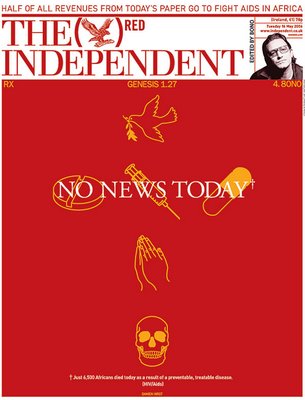
Bono Edits UK Newspaper
Today's edition of the British newspaper, The Independent, is edited by rock star and social activist Bono, with a cover designed by Damian Hirst.
The featured headline: "No News Today." In small type at the bottom of the cover, Bono elaborates, "Just 6,500 Africans died today as the result of a treatable, preventable disease (HIV/AIDS)."
Half the proceeds from the special edition will be donated to Bono's(Product)RED campaign, a world-wide branding effort to fight AIDS in Africa.
In an editorial, Bono writes, "I am as sick of messianic rock stars as the next man, woman and child. I am also tired of average work being given extra weight because it's attached to something with real gravitas, like the Aids emergency." But Bono is undeterred: "Right now, people you will never meet, who will never be able to thank you, are depending on you for the life-saving drugs which buying this paper will buy. For those people, my motivation or our (RED) motivation is irrelevant."
Media's new distribution channels are missing the point.
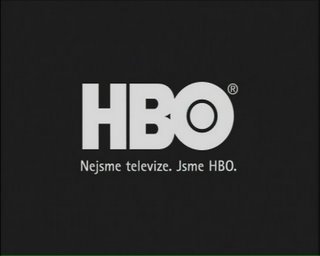
Every day it seems another media outlet is announcing a new distribution strategy. today it's the Discovery Channel, who'll be putting its programmes on iTunes. Yesterday Fox announced the same and NBC launched 2 web only channels. Last week CBS jumped in and before them ABC.
What problem are they solving?
Consumers are running away from traditional media so lets follow them to the Internet, or so goes the logic. However, consumers aren't really running away from traditional media, they're running away from traditional media content towards more interesting content that has developed outside traditional channels. It seems pretty basic, but this has nothing to do with the channel or distribution medium and everything to do with the content.
It's striking that HBO has not felt the need to find new channels for its content - instead people go to HBO because they find it interesting. As Larry David says, HBO is TV, but that hasn't stopped them from succeeding over and over again.
The cost to create a new channel far outweighs the cost to create new content. Creating new content is just harder but I think many of these distribution channels will quickly fail because they're pushing the same old stuff that people don't want.
Monday, May 15, 2006
Hummer's greatest cultural contribution - In the words of Homer J. & Friends

Can you name the truck with four wheel drive,
smells like a steak and seats thirty-five..
Canyonero! Canyonero!
Well, it goes real slow with the hammer down,
It's the country-fried truck endorsed by a clown!
Canyonero! (Yah!) Canyonero!
[Krusty:] Hey Hey
The Federal Highway comission has ruled the
Canyonero unsafe for highway or city driving.
Canyonero!
12 yards long, 2 lanes wide,
65 tons of American Pride!
Canyonero! Canyonero!
Top of the line in utility sports,
Unexplained fires are a matter for the courts!
Canyonero! Canyonero! (Yah!)
She blinds everybody with her super high beams,
She's a squirrel crushing, deer smacking, driving machine!
Canyonero!-oh woah, Canyonero! (Yah!)
Drive Canyonero!
Woah Canyonero!
Woah!
http://www.stlyrics.com/lyrics/thesimpsons/canyonero.htm
Available on the simpsons soundtrack at all good music retailers....
Confusion Revisited – Giving more depth to brands

A while ago I posted about giving people more confusing (ie interesting) marketing that wasn’t quite so obvious and straightforward.
Over the weekend I was reading over on Gareth Kay’s blog (http://garethkay.typepad.com/brand_new/) some posts about Lost (btw I love the ads they've been running in their breaks for their own fictional darhma initiative and related websites) and the depth or lack there of in most marketing which made me think on it more.
You know the basic thinking – add more layers of complexity as opposed to simple short message etc. It’s not that it is a new idea, but I think it is often still seen as being in opposition to the “Big Idea” school of thinking.
But I’ve never been convinced by that separation. 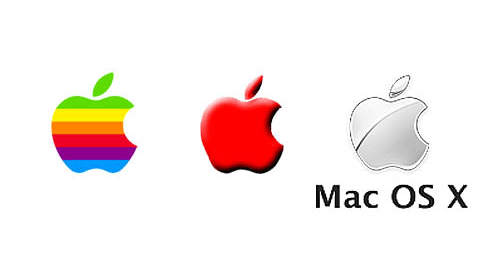


For easy instance: Honda (UK) and Apple have to a good extent both stuck to a big central idea, but executed in many different ways, with reasonable depth. It’s not the matching-luggage-set interpretation of a big idea where everything looks and feels exactly the same thing, but you definitely have an organizing idea. [Obviously these are still relatively simple examples compared with the kind of rich texture lots of us are aiming for in the future, but you get the point]
Basically it’s all just about the difference between a simple idea “washes whiter” and a simple idea with depth-potential “think different”. (On a side note:- I’m still waiting to see if the new VW work manages to pull it’s differing part together to any kind of uniting brand thought or not… at the moment it’s not doing it for me, anyone got a different perspective? – maybe I haven’t seen enough of it yet…)
So, to my current beef related to this –
The implications for efficacy metrics, and so research. To bite off a small chunk of this - We often see our ideas judged both by management and by research on what I’d call a campaign-centric basis… ie the question “does this fit my brand” is primarily based on executional clothing, or in research effort is put into asking how people feel about an ad. What SHOULD imho be happening is that the question is truly centered around the brand, not the campaign. This has always been true, but is even more true if we want the rich-texture depth kind of stuff we’re talking about.
Specific example: the whole brand linkage issue – While I’m quite happy to concede that it may be a reasonable proxy to success, but it is not a solid metric of success. It’s always amazed me that people put so much stock in whether an ad can be remembered as being for their brand (unprompted recall)…. As a business they shouldn’t care. They should care that seeing the ad changed the impressions and feelings held about their brand. But you can only really know that by probing about the brand.
Case in point David Letterman. I can’t tell you any of his jokes. I can’t tell you what I last heard him say, or when. (Most pretests &.post tests would discard the efficacy of his marketing on me already at this point) I can’t tell you his mum’s name either (though I am aware of her). In fact about the only specific thing I can tell you is that he has that bad habit of wearing bright white ‘sport’ socks with dark suits and shoes.... HOWEVER I have a pretty solid and well rounded sense of what he’s like, how much I like him and what I feel about him, his general politics, and whether I’d rather watch him than Jay or Conan. So, should research in to Dave Letterman see if I remember the jokes from his last trailer, and or even see if I recognize and can match the jokes to him? Or should it ask me about what I think of him? And see how that is different depending on what I’ve been exposed to?
This gets us towards a whole longer discussion on control cells / pre-posts, sample sizes big enough to break down exposure to different communications etc ….. and I’ve rambled on quite long enough.
Sufficed to say I think that the more we look to try and emulate complexity-rich culture in our work, the more I think we need to do two things better:
1 - Make sure we really have a meaningful simple organizing idea at the centre to give the complexity an anchor (duh!)
2- Call foul more often on simplistic vehicle-centric (eg ad centric), rather than brand centric ways research and metrics of success.
PS.
3 - be surprised and more thankful that the mainstream ‘low brow’ TV of today is lightyears ahead of what used to pass for ‘prime’-time TV, and it makes an easy case that brands need to do likewise. (Several books and articles recently have talked about how mass media has dumbed-up rather dramatically in the last couple of decades.)
Irrational Mac Love (again)

My "new" Mac died last Thursday. (By new I mean only had a few previous, careful advertising exec owners)
And it gave me an idea for a new measure of brand equity for IT brands: "Crash-Rage-Absorption" - it even has a three letter acronym, so it must be good ;-)
Basically my hard drive was fried. Now had this been my old dell notebook (the one everyone has at the airport security queues), I would have been off on a full blown vengeance-rant:- ‘die spawn of Beelzebub, you useless dell piece of crap” etc.
But because it was a Mac (cue angelic music and ray of sunshine), I kind of gave it the benefit of the doubt, perhaps even felt sorry for it and the abuse it has seen. Even thought about their HD supplier and how they were maybe to fault.
Sad but true.
We do blind vs branded taste scores for food to see the impact of the brand. So why not blind vs branded crash-rage scores for technology?
Trend: Conscious Consumption: (Product)RED vs. Moto

Motorola has joined U2 singer Bono's (Product)RED project and will start selling a red version of its Slvr mobile phone in the near future. A portion of revenue from sales of the red Slvr will go toward efforts to fight AIDS in developing countries.
The red Slvr won't likely provide a boost in sales for Motorola. "This will be a blip on the radar," said Ed Snyder, a stock analyst at Charter Equity Research. But the association with (Product)RED is certainly a positive development from a public-relations viewpoint. And a link with Bono can only help boost Motorola's quest to further position its brand as hip.
While Project Red has a philanthropic aim, Bono said in a recent interview with the BBC that the project is a commercial venture.
"Philanthropy is like hippy music, holding hands," he told the BBC. "This is more like punk rock, hip-hop, this should feel like hard commerce."
via Chicago Tribune
Google Trends: Norm MacDonald can't catch a break
Feel bad for Norm MacDonald. No, not because his dad was his homeroom teacher for 2 years in middle school or because he can't find success post-SNL. Feel bad for Norm MacDonald because one of Google's latest offerings, Google Trends, disproves Norm's long-held theory that Germans love David Hasselhoff. Ok, so the debunking data set is limited to online searches - but if you don't love a guy enough to Google-stalk him, is it really love?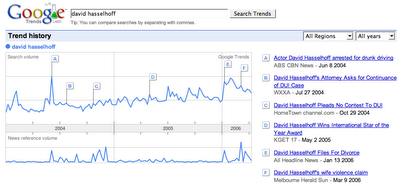
The Trends tool graphs search frequency, calling out peaks that coincide with news events dating as far back as 2004. It also identifies cities, regions, and languages where the term is most searched (calculated relative to total Google search volume). E.g. "Earthquake" is most searched for in San Diego, Pleasanton, CA and San Francisco. It's still a work in progress - it hasn't even made it into Beta yet - but worth a look. 
Neither Norm MacDonald nor David Hasselhoff should lose heart just yet. Norm, Germans may still love David Hasselhoff, just not as much as the rest of the world. And David, even though you've been through some rocky times lately, the Irish, Norwegians, and Aussies still love you. Well, online, anyway.
(Click images to enlarge.)
Scary but true: 24-hour Baby TV launches

You have to wonder why babies would need a 24-hour TV channel and what kind of parents will pay for this, yet it's still happening. BabyFirstTV, from everyone's favorite media company News Corp., will be entirely advertising free and available on DirecTV for $10 a month. In an article on WARC, it seems the American Academy of Pediatrics is less than thrilled. Their POV: children under 2 shouldn't watch TV at all, they should be playing with real people and things.
BabyFirstTV already faces competition from BabyTV another channel that apparently offers an identical product but better web graphics.
Trend: Bankrupt!: Michael's MegaCredit Debts
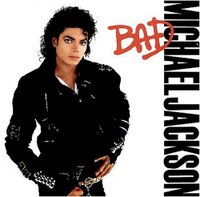
NY Times reports on the latest financial travails of Michael Jackson...and it don't look good at all. In fact, it looks just like the same damn story that we regular mortals face: Crippling Credit Interest.
The boys at Sony (his label, and co-investors in Mike's Music Catalog assets incl his own and The Beatles) called him for a secret meeting last December about getting his money woes in order. Ironically, Michael held the meeting in a $9000 a nite suite in Dubai - great start to your debt counselsing session, Mike! But why does Sony care about Mike's money? Well, as halfsies on a profitable music catalog, they don't want his half getting sold off in a garage sale to an even more unpredictable partner. Makes sense. It seems the conclusion of the meeting was that Sony would vouch for his Citigroup loan of $300 million...and he forfeits yet more ownership chips in the catalog to the bank.
But how much has this dude blown in a lifetime of "success"? And how did interest get him in debt consolidation counseling?
Some excerpts:
Sales of his recordings through Sony's music unit have generated more than $300 million in royalties for Mr. Jackson since the early 1980's, according to three individuals with direct knowledge of the singer's business affairs. Revenues from concerts and music publishing — including the creation of a venture with Sony that controls the Beatles catalog — as well as from endorsements, merchandising and music videos added, perhaps, $400 million more to that amount, these people believe.
"I think that Michael never had any concept of fiscal responsibility, or logical fiscal responsibility. He was an individual that had been overindulged by those that represented him or worked for him for all of his life," said Alvin Malnik, a former financial adviser to Mr. Jackson and a former lawyer for Meyer Lansky, the late mob kingpin. "There was no planning in terms of allocations of how much he should spend. As a businessman, you can forecast your spending for the next six months to a year. For Michael, it was whatever he wanted at the time he wanted.
It's possible that Mr. Jackson's biggest costs may have shifted in early 2000 away from his shopping sprees to simply shouldering enormous monthly interest payments on his debt. According to one executive involved in his affairs, Mr. Jackson was making monthly payments of about $4.5 million in 2005 on $270 million in debt. That works out to an annual interest rate of about 20%, a toll more familiar in the worlds of credit cards, subprime lending and loan sharks and not commonly encountered by wealthy people with substantial assets. But Mr. Jackson's wildly errant spending had forced him to confront harsher realities.
By the time Mr. Jackson finally met with the Sony executives in Dubai last December, his onerous interest payments had left him in a bind. Fortress Investment Group, a New York-based investment group that specializes in distressed debt, bought Mr. Jackson's loans from Bank of America in 2003 after the singer missed some payments. It then began levying high interest rates. Fortress, which did not respond to an interview request, threatened to call its loan on Dec. 20 last year because of Mr. Jackson's delinquency. What especially concerned Mr. Jackson about that, said one person familiar with the talks, was that it was just five days before Christmas.
To keep Mr. Jackson afloat, Sony arranged an extension with Fortress and brought in Citigroup and other potential lenders to arrange new financing at a lower rate. At a meeting in London on Valentine's Day earlier this year, Citigroup offered Mr. Jackson a new loan with a 6 percent rate. Citigroup struck a deal because Mr. Jackson agreed to give Sony the right to buy half of Mr. Jackson's 50 percent stake in the Beatles catalog at a future date for about $250 million, providing a backstop for Citigroup if Mr. Jackson defaulted.
To the amazement of others involved in the talks, Fortress then offered Mr. Jackson the same terms — a measure of how desirable the Beatles catalog has been and continues to be to the various financiers and advisers who have hovered around Mr. Jackson since he bought it two decades ago. By April, a final deal was in place. Citigroup ended up providing a $25 million mortgage on Neverland, most of which Mr. Jackson used to buy back a 5 percent stake in the catalog held by one of his early advisers, Mr. Branca.
Get the whole sordid financial details here
Saturday, May 13, 2006
More evidence of Apple's genius
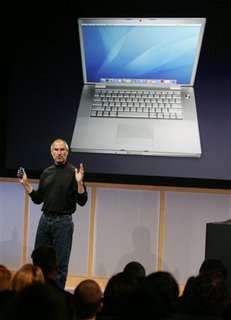
As if it wasn't already fairly obvious, this one did make me laugh. Even a press release talking about a future press release makes news for Apple. It's brilliant.
via AppleInsider















